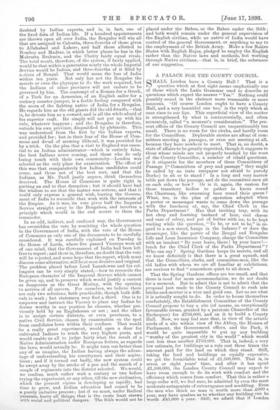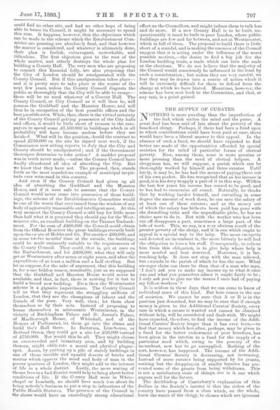A PALACE FOR THE COUNTY COUNCIL.
SHALL London have a County Hall ? That is a question which at first sight seems emphatically one of those which the Latin Grammar used to describe as questions which expect the answer " Yes." Nothing could possibly sound in the abstract more reasonable or more innocent. ' Of course London ought to have a County Hall, and a very beautiful one too,' is the reply which at once rises to our lips. This superficial view of the matter is strengthened by what is controversially, and often accurately, called " a moment's consideration." The pre- sent offices of the County Council are unquestionably too small. There is no room for the clerks, and hardly room for the Councillors. Deplorable stories are afloat of com- mittees meeting in passages, or even not meeting at all, because they have nowhere to meet. That is, no doubt, a state of affairs to be greatly regretted, though it suggests to those whose minds are not properly touched by the woes of the County Councillor, a number of ribald questions. Is it etiquette for the members of these Committees of Passage (" Committees of prey and passage" they might be called by an irate ratepayer not afraid to parody Burke) to sit or to stand ? Is a long and very narrow table put down the passage, and do the committee-men sit on each side, or how ? Or is it, again, the custom for these transitory bodies to gather in knots round the Chairman, like swarming bees round their queen ? What, too, is the plan of operation adopted when a porter or messenger wants to come down the passage with the luncheon of, say, the Chief Clerk in the Parks Department ? Has that inviting tray, with its hot chop and foaming tankard of beer, cool cheese and vase of celery, and pat of butter with ice, to be kept waiting while the question, " To be, or not to be," in re- gard to a new street, hangs in the balance ? or does the messenger, like the porter of the Bengal and Bengalee Life and Loan Insurance Company, charge the Committee with an insolent " By your leave, there ! by your leave !- lunch for the Chief Clerk of the Parks Department" ? Who can say ? Spring Gardens keeps its secrets, and all we know definitely is that there is a great squash, and that the Councillors, clerks, and committee-men, like the old ladies with whom we are all familiar at exhibitions, are anxious to find " somewhere quiet to sit down."
That the Spring Gardens offices are too small, and that there is need for more accommodation, we do not doubt for a moment. But to admit this is not to admit that the proposal just made to the County Council to rush into bricks-and-mortar is a wise and good one. Let us see what it is actually sought to do. In order to house themselves comfortably, the Establishment Committee of the County Council propose to buy a site (of course, on exceptionally favourable terms, granted by a patriotic Chancellor of the Exchequer) for £750,000, and on it to build a County Hall. Now, we may feel sure that, in view of the artistic needs of a site within view of the Abbey, the Houses of Parliament, the Government offices, and the Park, it would be quite impossible to put up any building "Worthy of the greatest city in the world" which would cost less than another £750,000. That is, indeed, a very low estimate, for buildings as a rule cost three times the amount paid for the land on which they stand. Still, taking the land and buildings as equally expensive, we get the formidable total of £1,500,000. That is, in seven or eight years' time, and after it has spent £1,500,000, the London County Council may expect to have room enough to do its work with comfort and the efficiency which comes from comfort. That this is rather a large order will, we feel sure, be admitted by even the most moderate antagonists of extravagance and muddling. Even the men who think no man is worth more than £300 a year, may have qualms as to whether any building can bo worth £45,000 a year. Still, we admit that if London could find no other site, and had no other hope of being able to house its Council, it might be necessary to spend this sum. It happens, however, that the objections which can be made to the scheme which the Establishment Com- mittee are pressing are absolutely final, and that however the matter is considered, and whatever is ultimately done, their plan is foolish, extravagant, unworkable, and ridiculous. The first objection goes to the root of the whole matter, and utterly destroys the whole plan for building a County Hall. The very men who are proposing to commit this financial folly, are also proposing that the City of London should be amalgamated with the County Council. But if this amalgamation takes place— and it is pretty sure to take place in the course of the next few years, unless the County Council disgusts the public so thoroughly that the City will be able to escape— there will be no need whatever of a County Hall. The County Council, or City Council as it will then be, will possess the Guildhall and the Mansion House, and will thus be in occupation of the best possible offices and the best possible sites. While, then, there is the virtual certainty of the County Council getting possession of the City halls and offices, it would be little short of treason to the rate- payers to spend some £1,500,000 in buildings which in all probability will have become useless before they are finished. What will be the position, should the contract to spend £750,000 on the site be signed next week, if the Commission now sitting reports in July that the City and County should be amalgamated ; and if the Government thereupon determine to take action ? A madder proposal was in truth never made,—unless the County Council have finally abandoned all idea of absorbing the City. But we know that they have not.. The proposal, then, stands forth as the most scandalous example of municipal inepti- tude ever witnessed in this country.
And even if the County Council had given up all idea of absorbing the Guildhall and the Mansion House, and if it were safe to assume that the County Council would'never come into possession of those build- ings, the scheme of the Establishments Committee would be one of the worst that ever issued from the wisdom of any body of apparently reasonable and intelligent men. At this very moment the County Council could buy for little more than half what it is proposed they should pay for the West- minster site, an excellent building on the Thames Embank- ment, For the sum of £400,000 the Council could obtain from the Official Receiver the great buildings recently built upon the es, ate of Hobbs and Co. For another £60,000, and in some twelve months' time at the outside, the buildings could he made eminently suitable to the requirements of the County Council. They could, that is, get at once on the Embankment, and for £460,000, what they will only get at Westminster after seven or eight years, and after the expenditure of at least a million and a half sterling. But let us suppose, for the sake of argument, that this building is, for some bidden reason, unsuitable, just as we supposed that the Guildhall and Mansion House would never be available, and that, in fact, there is nothing for it but to build a brand new building. Even then the Westminster scheme is a gigantic impertinence. The County Council tell us that they represent the struggling millions of London, that they are the champions of labour and the friends of the poor. Very well, then; let them show themselves so by their acts. Instead of proposing to house themselves in aristocratic Westminster, in the vicinity of Buckingham Palace and St. James's Palace, of Marlborough House, of Whitehall, and of the Houses of Parliament, let them go iuto the slums and build their Hall there. In Battersea, Limehouse, or Bethnal Green. they could get a site for £50,000 instead of £750,000. Nor would this be all. They might choose an overcrowded and insanitary area, and by building thereon, might obliterate a moral and physical plague- spot. Again, by putting up a pile of stately buildings in one of those terrible and squalid deserts of bricks and mortar which oppress the mind and body of man in the poorer quarters of London, they might add to the interest of life in a whole district. Lastly, the mere seating of theme. Ives in a bad district would help to bring about better conditions of life. If the County Hall were in White- chapel or Lambeth, we should hear much less about its being nobody's business to put a stop to infractions of the Public Health Statutes. The presence of the Council in the slums would have an exceedingly strong educational effect on the Councillors, and might induce them to talk less and do more. If a new County Hall is to be built, un- questionably it must be built in poor London, where public buildings are few and far between, and not at Westminster, which is full of them. The proposal to build there is little short of a scandal, and is making the enemies of the Council suggest that it is acting under the influence of the worst possible motives,--the desire to find a big job for the London building trade, a trade which can turn the scale at the elections. We do not believe that the majority of the Council would consciously be influenced in the least by such a consideration ; but unless they are very careful, we fear they may be drawn into a course of action which it will be extremely difficult for them to defend from the charge at which we have hinted. Meantime, however, the scheme has been sent back to the Committee, and that, at any rate, is a point gained.



































 Previous page
Previous page